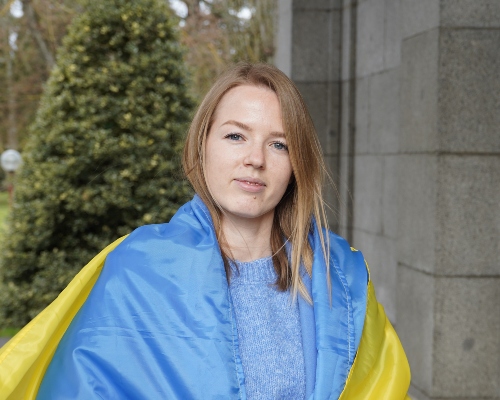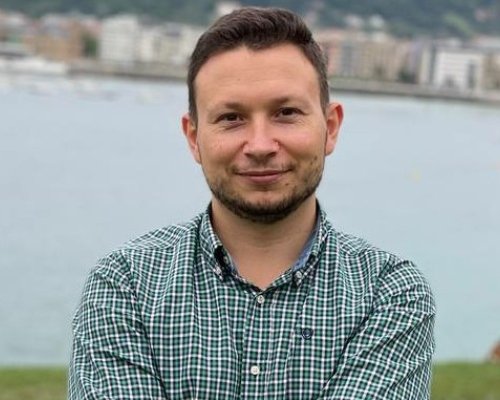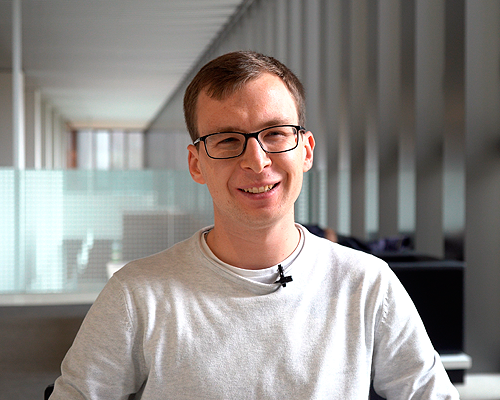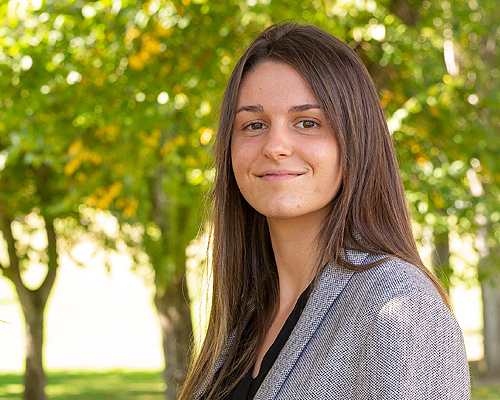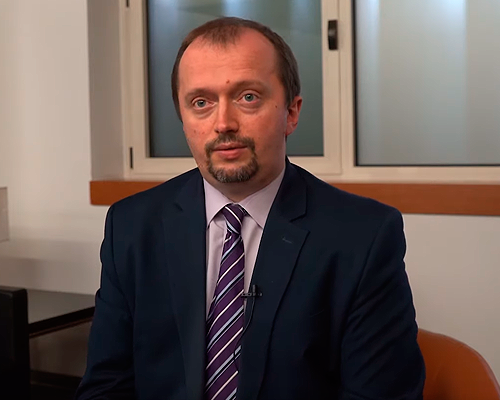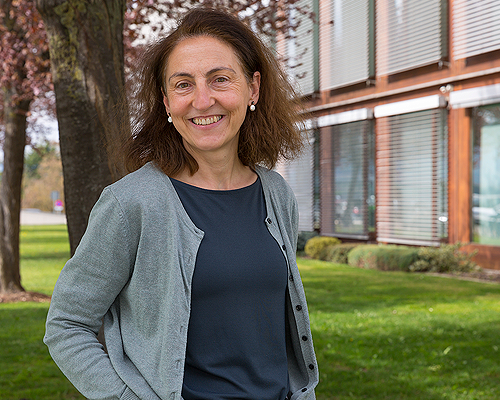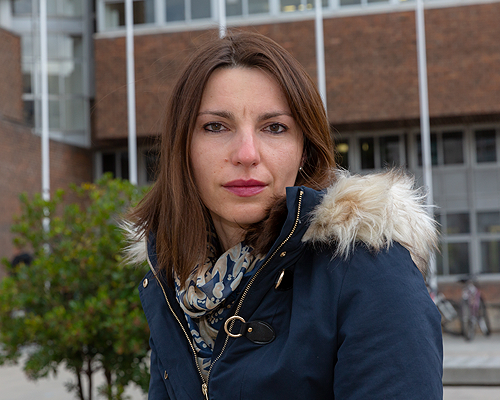financial aid for Ukraine. University of Navarra

How can I help?
Students, employees and alumni have taken action to respond to the humanitarian crisis caused by the war in Ukraine. You can help with the following initiatives. Also, if you have any proposal, send it to campus@unav.es
Kateryna Dudko (EYP'22)
Student of Early Childhood Education
General recommendations
People coming from Ukraine have refugee status. This means that they have a series of rights and support in terms of housing, food, health, Education, etc.
To be activated, they must go to the officially established points in each autonomous community.
In a humanitarian crisis status , problems will remain for a long time. Your financial aid is not urgent; it will be valid for a long time, so do not rush your decision.
Follow the recommendations of the Ministry of Foreign Affairs, European Union and Cooperation regarding Ukraine and the other countries involved in the crisis, such as neighbouring countries. They make a specific appeal NOT to travel to Ukraine under any circumstances.
Channel financial aid through humanitarian organisations that have been working in the area for years or with links to local organisations.
In an increasingly complicated context, these organisations have the capacity and experience to mobilise all available resources to cope with the crisis.
The staff of an NGO working in armed conflict follows a rigorous, experience-based selection process and training. It requires not only technical knowledge but also, among others, from the field of cooperation and the specific context in which the emergency occurs.
Sending volunteers without the necessary skills can put at risk both the implementation of the activities of attendance to the population, and the lives of the volunteers and the local staff with whom they collaborate.
Monetary donations are advised, as goods donated in kind may not be adequate to the needs of the population and to the humanitarian and logistical status on the ground which can change rapidly in this extraordinary status crisis.
Financial contributions are more efficient. Goods donated individually may entail additional costs and logistical administrative difficulties (need for packaging, additional customs procedures, expiry dates for food and medicines, etc.) for the NGOs and public administrations that manage them, making the use of standardised humanitarian response kits more practical and effective, in the event that the products needed are not available locally or in neighbouring countries.
In a status of conflict, all people and communities have capacities to respond despite their vulnerability. Financial contributions enable the purchase in local markets, helping to activate Economics in these countries.
It is recommended that the information received be cross-checked with reliable humanitarian sources and actors. In particular, it is advisable to regularly consult the website of the Ministry of Foreign Affairs, European Union and Cooperation, following the recommendations of the Spanish Agency for Cooperation development.
Make sure that the sources of information you use are serious and honest. Do not share hoaxes or information that fuels hate speech or fake news.
Reception of refugees
This is a complex process, but one that accredited organisations such as the Red Cross and CEAR, local governments and local authorities are used to.
We invite reflection, because these are long processes.
If someone is considering the possibility of taking in a person or a family, they have to understand that this can be prolonged over time, and the economic capacity of the host family is going to be a relevant point.
This reception is of long duration.
The best way to help them is by fostering the families concerned. Do not separate them from their families. International experience shows that uprooting a child or adolescent from his or her environment at certain times can have very negative consequences. Although it may seem like a good option, it is not the most advisable alternative.
These are long-term and stable situations.
In order for foster care to be legal and in the best interests of the child, a series of conditions must be met requirements, such as the child being in status confirmed neglect, that the best decision for the child is to find a foster family in another country and that these foster families are suitable, for which they have to go through a series of procedures established by the corresponding governments for their accreditation.
The different administrations have set up their own tools for the attention and management of the emergency in Ukraine. We advise you to contact contact with your Autonomous Community or City Council to send them your offer and they can contact you at contact if necessary.
Faced with the arrival of people from Ukraine, what should not be done?
In times of conflict and humanitarian crisis, adoption of children is not an option.
It is very difficult to determine which status family they are in and therefore efforts are focused on caring for them on the ground and reuniting them with their families.
It is not advisable to adopt unaccompanied children without their families, because of the risk and harm it would pose to them as a vulnerable group.
All governments and specialised emergency organisations recommend that action be taken through, and with the support of, the specialised mechanisms.
With the best will, we can put at risk both the people and families we host and the families and people who host.
They have rights, and those rights have to be recognised in order to be exercised.
It is not advisable to organise buses or to encourage or support this subject of initiatives that in an improvised and informal manner (without permits, authorisations, professional drivers, translators or doctors) aim to transport people in conditions that do not guarantee their safety.
status These initiatives are counterproductive and far from improving care for the Ukrainian population fleeing the armed conflict, they contribute to vulnerability and can have undesirable consequences, especially for the most vulnerable population, such as women and children, giving rise to situations of abuse and trafficking of children.
Protocols for the transport of people and especially minors crossing borders have been in place for years.
Remember that people fleeing from conflict are experiencing severe stress, trauma and grief status . This is not the best time to make hasty decisions. They need psychosocial, emotional and medical support. They also need to know their status legal status and their rights.
Despite these circumstances of vulnerability caused by war, these people fleeing conflict remain subjects of rights and their own free will. It is up to them to decide where they want to go, how and in what form. Asylum and refuge is not just about "bringing" or "taking" people from one place to another.
Pope Francis has called on the faithful to pray for peace. In these days of Lent, prayer and fasting can help, as the Pope said: "to be close to the suffering of the Ukrainian people, to feel that we are all brothers and sisters and to implore God for an end to the war".
Chaplaincy encourages you to go to one of the oratories at campus and dedicate this prayer for peace:
Almighty God, Father of all, we pray for peace in Ukraine,
we pray for peace in Ukraine,
which is suffering from the barbarity of war.
Give light to those who have the power to stop such violence,
so that, above their partisan interests,
promote harmony and peace.
sample your paternal love for the most defenceless,
towards so many innocent human lives.
Sow hope in all those who live
under the burden of war
that they may work for a better world
so that your kingdom may shine forth:
kingdom of truth and life,
kingdom of holiness and grace,
kingdom of justice, love and peace.
Through Jesus Christ, our Lord.
Amen.
Holy Mary, Queen of Peace,
pray for us.
The Schools and chaplains are launching other individual initiatives:
- School of ArchitectureAdoration of the Blessed Sacrament - Wednesdays, from 3:00 to 3:30 pm.
- Way of the Cross for Peace (English) - every Friday of Lent, from 3:00 to 3:40 p.m. Central Building Chapel. Contact: Fr. José Alviar(jalviar@unav.es)
In addition, every Friday at 3 p.m. there will be a Rosary for peace in Ukraine at Shrine of Our Lady of Fair Love of campus:
|
11 March |
School of Law, School of Education and Psychology and high school Mayor Goroabe |
|
18 March |
School of Medicine, School of Nursing and the Goimendi and Larraona Halls of Residence. |
|
25 March |
School of speech, Schools , and the Belagua-Torres and Mendaur Halls of Residence. |
|
1 April |
School of Pharmacy and Nutrition, School of Sciences and the Olabidea and Santa Clara Halls of Residence. |
|
8 April |
School of Economics, School of ISSA and Colegios Mayores: Belagua-Fases and Santa María del Lago. |
|
29 April |
School of Architecture School of and Letters and Philosophy high school Mayor Aldaz |
Dr. José Lamo de Espinosa
MD, PhD. Surgeon of the Hip and Tumour Unit. coordinator area de Sarcoma (CUN). researcher area de Terapia Celular (CIMA). Doctor of Osasuna Magna
These are some of the collection points of financial aid to humanitarian:
- cafeteria K'Fesico, calle Diego Salva Lezaun 8 Bajo - Pamplona. Every day from 7.00 to 9.00 a.m. / 662 55 57 57
- Rodamos Flims, calle La Cultura 5-7 - Barañáin. Monday to Friday from 14.00 to 16.00 / 679 76 37 08
- Boxing Club Boxrus, calle Mendigorría 8-10 Bajo - Pamplona Monday to Friday from 10.00 to 12.00 and Tuesday and Thursday from 19.00 to 21.00.
- Juslapeña, 5 - Orcoyen. Monday to Friday from 19.00 to 21.00 / 626 82 08 01
- La Tienda La Esquina, calle Diego Salva Lezaun 8 Bajo - Pamplona. Every day from 19.00 to 21.00 / 600 64 87 02
- cafeteria Artwhol Restaurant, calle Teobaldos 2 - Pamplona. Tuesday from 11.00 to 21.00 / +380 95 338 6445 (only WhatsApp)
- Amarante San Juan Beauty Centre, Avenida Barañáin 11 Bajo - Pamplona. Tuesday to Friday from 10.00 to 18.00 / 688 890 570
- Calle Euntzeluzea 15, Bajo A - Ardoi, Zizur Mayor. Every day from 14.00 to 20.00 / 637 921 224 / 687 137 507
- Irun: Slavianka Shop, Avda. Nafarroa 13 (943 660 898). Parroquia de Pentecostes, Arturo Campión Kalea, 6. From 19.00 to 21.00. (672 839872/ 673 969842).
- San Sebastian: Calle Jaizkibel, 6, Trintxerpe. (642 042512/ 660 901045) Monday to Friday, 19:00-21:00. Saturday 10.00-15.00.
- San Sebastián: Calle Usandizag, 9. Every Tuesday in March from 9.30 am to 4.30 pm.
- Donations, issue account: ES16 2095 5001 0091 1443 7029 (indicate concept DONATION).
- More contacts: 642 772 760/636 079690 ucraniaeuskadi@gmail.com
Madrid City Council has temporarily suspended the collection of food, clothing, pharmacy and parapharmacy products. Due to the great show of solidarity and donations, the City Council is recommending to make financial donations.



